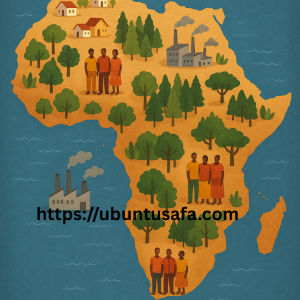Did You Know Social Media Platforms Often Promote Racism in Their Algorithms?
Algorithms Can Boost Hate, Suppress Black Voices, and Embed Racial Bias in Moderation
The internet promised to be a borderless space of free expression.
But behind the scenes, invisible walls of bias and discrimination shape what we see—and what is hidden.
Social media platforms use algorithms—complex software that decides what content to show and suppress.
Sadly, these algorithms often amplify racist content while silencing marginalized voices.
-“Even the internet has borders—just invisible ones.”
-How Algorithms Perpetuate Racism
-Amplifying Hate and Misinformation
Content with outrage, anger, and hate tends to get more engagement — so algorithms prioritize it.
This often means racist and xenophobic posts spread faster and wider than messages of unity or justice.
Suppressing Black and Minority Voices-
Black creators and activists report their posts being shadowbanned or removed more frequently.
Hashtags related to racial justice (e.g., #BlackLivesMatter) have been temporarily suppressed or hidden in trends.
Automated moderation systems fail to understand cultural context, leading to unjust takedowns.
Built-In AI Bias-
Algorithms are trained on data that reflects historical and societal biases.
Without careful design, AI can replicate and amplify racial stereotypes or prioritize dominant cultural narratives.
Examples include facial recognition tech misidentifying people of color or language models misunderstanding dialects.
Why It Matters-
Social media shapes public discourse, political mobilization, and cultural trends.
When racism is amplified and Black voices suppressed, inequality deepens online and offline.
The lack of transparency around algorithms hides these biases from public scrutiny.
Toward Ethical Tech and Digital Justice
Transparency: Platforms must reveal how algorithms work and impact marginalized groups.
Inclusive Design: Diverse teams should build and audit AI systems to reduce bias.
Community Control: Users, especially from affected communities, need a say in moderation policies.
Regulation: Governments and civil society must hold tech companies accountable for discrimination.
Digital Literacy: Users should be empowered to recognize and challenge algorithmic bias.
Final Word
The fight against racism must extend to the digital world — because algorithmic injustice affects real lives and real futures.
Algorithms Can Boost Hate, Suppress Black Voices, and Embed Racial Bias in Moderation
The internet promised to be a borderless space of free expression.
But behind the scenes, invisible walls of bias and discrimination shape what we see—and what is hidden.
Social media platforms use algorithms—complex software that decides what content to show and suppress.
Sadly, these algorithms often amplify racist content while silencing marginalized voices.
-“Even the internet has borders—just invisible ones.”
-How Algorithms Perpetuate Racism
-Amplifying Hate and Misinformation
Content with outrage, anger, and hate tends to get more engagement — so algorithms prioritize it.
This often means racist and xenophobic posts spread faster and wider than messages of unity or justice.
Suppressing Black and Minority Voices-
Black creators and activists report their posts being shadowbanned or removed more frequently.
Hashtags related to racial justice (e.g., #BlackLivesMatter) have been temporarily suppressed or hidden in trends.
Automated moderation systems fail to understand cultural context, leading to unjust takedowns.
Built-In AI Bias-
Algorithms are trained on data that reflects historical and societal biases.
Without careful design, AI can replicate and amplify racial stereotypes or prioritize dominant cultural narratives.
Examples include facial recognition tech misidentifying people of color or language models misunderstanding dialects.
Why It Matters-
Social media shapes public discourse, political mobilization, and cultural trends.
When racism is amplified and Black voices suppressed, inequality deepens online and offline.
The lack of transparency around algorithms hides these biases from public scrutiny.
Toward Ethical Tech and Digital Justice
Transparency: Platforms must reveal how algorithms work and impact marginalized groups.
Inclusive Design: Diverse teams should build and audit AI systems to reduce bias.
Community Control: Users, especially from affected communities, need a say in moderation policies.
Regulation: Governments and civil society must hold tech companies accountable for discrimination.
Digital Literacy: Users should be empowered to recognize and challenge algorithmic bias.
Final Word
The fight against racism must extend to the digital world — because algorithmic injustice affects real lives and real futures.
Did You Know Social Media Platforms Often Promote Racism in Their Algorithms?
Algorithms Can Boost Hate, Suppress Black Voices, and Embed Racial Bias in Moderation
The internet promised to be a borderless space of free expression.
But behind the scenes, invisible walls of bias and discrimination shape what we see—and what is hidden.
Social media platforms use algorithms—complex software that decides what content to show and suppress.
Sadly, these algorithms often amplify racist content while silencing marginalized voices.
-“Even the internet has borders—just invisible ones.”
-How Algorithms Perpetuate Racism
-Amplifying Hate and Misinformation
Content with outrage, anger, and hate tends to get more engagement — so algorithms prioritize it.
This often means racist and xenophobic posts spread faster and wider than messages of unity or justice.
Suppressing Black and Minority Voices-
Black creators and activists report their posts being shadowbanned or removed more frequently.
Hashtags related to racial justice (e.g., #BlackLivesMatter) have been temporarily suppressed or hidden in trends.
Automated moderation systems fail to understand cultural context, leading to unjust takedowns.
Built-In AI Bias-
Algorithms are trained on data that reflects historical and societal biases.
Without careful design, AI can replicate and amplify racial stereotypes or prioritize dominant cultural narratives.
Examples include facial recognition tech misidentifying people of color or language models misunderstanding dialects.
Why It Matters-
Social media shapes public discourse, political mobilization, and cultural trends.
When racism is amplified and Black voices suppressed, inequality deepens online and offline.
The lack of transparency around algorithms hides these biases from public scrutiny.
Toward Ethical Tech and Digital Justice
Transparency: Platforms must reveal how algorithms work and impact marginalized groups.
Inclusive Design: Diverse teams should build and audit AI systems to reduce bias.
Community Control: Users, especially from affected communities, need a say in moderation policies.
Regulation: Governments and civil society must hold tech companies accountable for discrimination.
Digital Literacy: Users should be empowered to recognize and challenge algorithmic bias.
Final Word
The fight against racism must extend to the digital world — because algorithmic injustice affects real lives and real futures.
0 Kommentare
0 Geteilt
1KB Ansichten
0 Bewertungen




